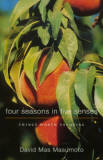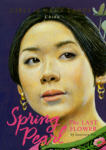|
The AACP Newsletter |
||
| Since 1970 | Asian American Curriculum Project, Inc. - Books for All Ages | March 2003 |
|
By Leonard Chan This year's Reading the World Conference was held at the University of San Francisco on March 1 and 2, 2003. The event was well attended by hundreds of educators and interested guest. Also in attendance were many book vendors, publishers, and authors. One of the most fascinating exhibits was the Internet Archive's bookmobile. This van contained all the hardware needed to print paperback books for around a dollar apiece. The bookmobile doesn't actually contain the data for the 20,000 and more public domain books that it can print. Instead, it has a satellite connection to the Internet that allows it to download the information from its headquarters in San Francisco. The Internet Archive's mission is to record human knowledge in easily accessible forms and make this information available to people all over the world. The Internet Archive's bookmobile is their way of demonstrating the technology needed to create books cheaply for the masses. Check out Internet Archive's website (http://www.archive.org/) to see if you can get the bookmobile to visit your school or library, and or to download your favorite public domain books. Internet Archive's records of the Internet are also quite interesting - have fun using their "Way Back Machine." |
|||||||||||||||||||||||||||||||
Up Coming EventsHere are some other events that AACP will soon be attending. Invite us to your events.
Our country is the world, our countrymen all mankind.
Whenever we see the doctrine of peace embraced by a nation, |
Editor's MessageOur schedule for the next month is a little busy. That's great, because this means that we have plenty of opportunities to meet all of you :). If you are near to any of these events, please drop by and visit us. If you have an event later this year, send me the information for your affair. If we believe our readers will find your event of interest, we will post your event on the newsletter schedule.Thank you Professor Mary Yu Danico for sending us such a notice. The Association for Asian American Studies (AAAS) will have a regional conference at Cal Poly in Pomona, CA on March 21-23. We are unable to attend, but I am posting on our website the MS Word document (http://www.asianamericanbooks.com/aaas0303.doc) of your conference schedule for all our newsletter subscribers to read. A special thank you goes to our guest editor Emiko Oye. Emiko volunteered her time to help us with getting this newsletter out and is now working on another AACP project. AACP has many projects and duties that we could use help on. If you would like to volunteer your time to help with any of these projects and duties, please get in touch with us. Thank you Leanna Kim and Ken Jue for sending us your comments and book suggestions. Keep them coming everyone :). Thank you Frances Kai-Hwa Wang of Asian American Village Online for helping to bring AACP to your readers by reprinting our last editorial on your website. For those of you that own an AACP calendar, please note that the dates for the Bok Kai Festival are March 8th and 9th, and not the ones listed.
Leonard Chan Give Us Your FeedbackPlease feel free to send us your reviews, comments, and book suggestions.
You can contact us at - |
||||||||||||||||||||||||||||||
|
|
|||||||||||||||||||||||||||||||
|
Editorial by Philip Chin |
|||||||||||||||||||||||||||||||
|
As an Asian American living in what is predominately an Asian American community in America (Daly City, CA) it is always amazing to me how invisible other minority communities are when compared to the African American community. So it was quite extraordinary to read Cornell West in his book, "Race Matters," speaking about how the African American leadership in the 1980s and 1990s seemed to be in a state of rigor mortis. By comparison, Asian American leadership appears to be in a state of advanced decomposition. Asian Americans it should be noticed still cannot even be referred to outside of their group identity while the African American community at least has several nationally known leaders including Jesse Jackson, Louis Farrakhan, Martin Luther King III, as well as Al Sharpton. Who represents the Asian American communities nationwide? Margaret Cho, the nationally televised comedienne?
Factors that Create Leadership (Community and Purpose) What Cornell West talks about doesn't just apply to the African community but to the greater American community as a whole. The mortar that prevents the building blocks of society from falling apart are the ties that bind people to the community. These ties can be religious, civic, or both. Some tie must exist between the individual and the larger society otherwise you will have an individual with no social conscience, who will be fully capable of committing barbarities against the community. These are the people we regard as criminals and terrorists.
|
Destructive Forces that Break Down Communities West also examines the reasons for the collapse of communities in African American society, namely "the saturation of market forces and market moralities in black life and the present crisis in black leadership." What we see isn't just a failure within the African American community but a failure of American leadership in general to address the problems of market propaganda and its overwhelming influence on what people want and how they obtain those things. There is no question that children and adults are influenced by what is presented to them through the media. What this has created is an "instant gratification" society. For example, many kids no longer have the patience to handle the traditional methods of learning that past generations endured. Instead of a patient building of knowledge everything in education now must be in "MTV style" which is fast, rapacious, quickly moving audio and videos. In the superficial and self-centered world promoted by the media, traditional values such as family, hard work, and community become increasingly meaningless. Few can afford to live like one of the rich people portrayed in television commercials, yet many try and most fail to achieve that unrealistic standard of living. Imagine the effect that such unobtainable media portrayals of American life have on the average Egyptian, Pakistani, or Nigerian. What results when expectations are too high or wrongly directed? Wouldn't helplessness, frustration, and anger result? Can drugs, crime, and terrorism leading to the deterioration of communities and society be far behind?
Conclusion
|
||||||||||||||||||||||||||||||
The following books are discounted for subscribers to our newsletter. The discounts on these books end March 31, 2003. | |

|
The Magical Monkey King
Classic Chinese Tales Retold by Ji-Li Jiang |

|
Four Seasons in Five Senses
By David Mas Masumoto |

|
Finding My VoiceBy Marie G. Lee2002, 214 pages, paperback. As she tries to enjoy her senior year and choose which college she will attend, Korean American Ellen Sung must deal with the prejudice of some of her classmates and pressure from her parents to get good grades.
View Additional Information
|
|
|
Beacon Hill BoysBy Ken Mochizuki2002, 201 pages, hardback. In 1972 in Seattle, a teenager in a Japanese American family struggles for his own identity, along with a group of three friends who share his anger and confussion.
View Additional Information
|

|
Spring Pearl
By Laurence Yep |
Copyright © 2003 by Asian American Curriculum Project, Inc. (a non-profit organization since 1970)
Visit our website at AsianAmericanBooks.com
To unsubscribe simply reply to this email and type "REMOVE" in the subject line.